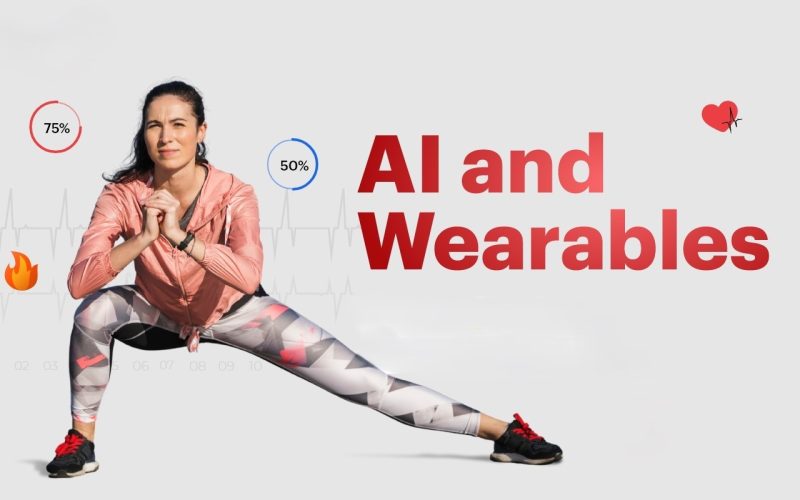Introduction
The healthcare industry is changing rapidly thanks to technology. Two of the most important technologies driving these changes are artificial intelligence (AI) and wearable devices. These innovations are not only helping us track our health but also allowing us to make smarter decisions to improve our overall well-being. From tracking daily activities to offering personalized health advice, AI and wearables are making healthcare more accessible and helpful.
In this article, we’ll take a look at how AI and wearables are shaping the future of personal health. We’ll explore the benefits of these technologies, how they work together, and what the future may hold.
What is AI in Personal Health?
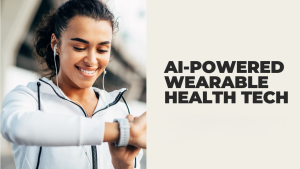
Artificial intelligence (AI) means machines that can think and learn like humans. In personal health, AI helps by analyzing large amounts of health data to find patterns and offer helpful advice. AI tools can suggest health tips, predict risks, and even help doctors diagnose health problems.
AI has made big progress in areas like predicting health risks and personalizing medicine. It helps healthcare providers access better patient data, leading to more accurate health plans.
AI can also work with wearable devices to track things like heart rate, physical activity, and sleep. This data is analyzed in real-time, giving instant feedback that helps individuals make better health choices.
How Wearables Are Changing Personal Health
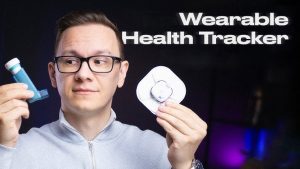
Wearable devices, like smartwatches and fitness trackers, are becoming a key part of our daily lives. These devices track important health data such as steps taken, sleep, heart rate, and blood oxygen levels. Popular wearables like the Apple Watch, Fitbit, and Oura Ring make it easier to monitor health in real-time.
Key features of wearables include:
- Activity Tracking: Wearables track physical activity like steps, calories burned, and workouts. This helps users stay active and meet fitness goals.
- Heart Rate Monitoring: Continuous heart rate monitoring helps users keep an eye on their heart health throughout the day.
- Sleep Tracking: Wearables track sleep quality, helping users improve their sleep habits.
- Health Alerts: Some wearables can detect problems, like a high heart rate or low oxygen levels, and alert the user or even emergency services if needed.
Wearables also work with health apps and sync data with cloud systems, making it easy for both individuals and healthcare providers to access up-to-date health information.
The Synergy of AI and Wearables
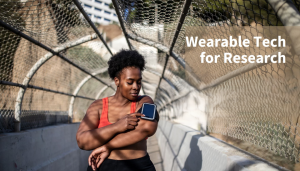
While both AI and wearables are useful on their own, they work even better together. Wearables collect lots of health data, and AI analyzes this data to offer valuable insights.
For example, a smartwatch tracks activity and sleep, while an AI app can use that data to give personalized advice. The app might suggest improving sleep habits or offer exercises to improve heart health based on patterns detected in the data.
Some health platforms are already using AI to analyze wearable data and predict health problems before they get worse. For instance, AI might notice unusual heart rate patterns and warn the user to see a doctor, helping prevent serious issues before they happen. This type of early intervention can save lives and improve long-term health.
Tips for Using AI and Wearables to Improve Your Health
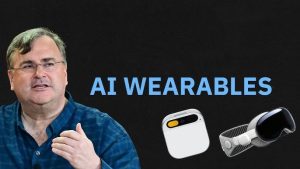
- Pick the Right Device: Not all wearables are the same. Choose one based on the features that matter most to you, like fitness tracking, heart rate monitoring, or sleep tracking.
- Set Goals and Track Progress: Use your wearable to set health goals, like walking more steps or getting better sleep. Track your progress and adjust as needed.
- Sync Your Data: Make sure your device syncs regularly with an app or cloud system to keep your health data updated. This ensures both you and your doctor have the most accurate information.
- Use AI Apps: Many health apps now use AI to give personalized advice. These apps can help you make the most of the data from your wearable device.
- Monitor Mental Health: Look for wearables and apps that help track mental health, such as stress levels or mood. Mental health is just as important as physical health.
The Future of AI and Wearables in Personal Health
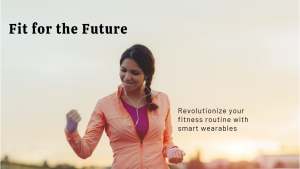
As AI and wearable technology continue to grow, the future of personal health looks very exciting. Here’s what we can expect:
- More Accurate Diagnoses: AI will continue to improve, helping doctors spot health problems earlier and more accurately. With real-time data from wearables, doctors will have a clearer picture of a patient’s health, leading to faster treatments.
- Personalized Health Plans: AI could be used to create custom health plans. Wearable data, along with genetic information and lifestyle habits, could help create a health plan tailored to each person’s needs.
- Telemedicine Integration: AI and wearables will make telemedicine (healthcare through video calls) even more common. Wearables can provide doctors with continuous health data, allowing for virtual consultations and regular check-ups.
- Mental Health Monitoring: New AI tools are being developed to help track mental health using wearables. Devices may analyze stress, sleep, and mood patterns, helping users better manage their mental well-being.
- Chronic Disease Management: AI and wearables will play a big role in managing chronic conditions like diabetes or high blood pressure. With continuous data, these devices can alert users and doctors about potential problems before they become serious.
Comparative Table: Popular Wearables and Their Key Features
| Device | Key Features | Best For |
|---|---|---|
| Apple Watch Series | Heart rate monitor, ECG, fitness tracking | Overall health monitoring |
| Fitbit Charge 5 | Sleep tracking, stress management, GPS | Fitness and sleep tracking |
| Oura Ring | Sleep monitoring, body temperature sensor | Sleep and recovery analysis |
| Whoop Strap 3.0 | Recovery tracking, heart rate variability | Athletes and performance |
| Garmin Venu 2 | Health snapshot, pulse oximeter, GPS | Fitness and outdoor sports |
This table highlights some of the best wearables, each with unique features to support your health and fitness journey.
Conclusion
AI and wearables are changing the way we take care of our health. Together, these technologies make it easier to track our health and get personalized advice to lead healthier lives. From early health predictions to real-time tracking, these tools are making healthcare more accessible and proactive than ever.
As both AI and wearable tech continue to improve, the future of health looks even brighter. By using these tools, we can take control of our health and unlock our full potential.
Call to Action
Ready to take charge of your health? Explore the latest AI-powered wearables and find out how they can help you track your fitness, manage stress, and stay healthy. Visit our website today to discover the best devices for your health journey.






